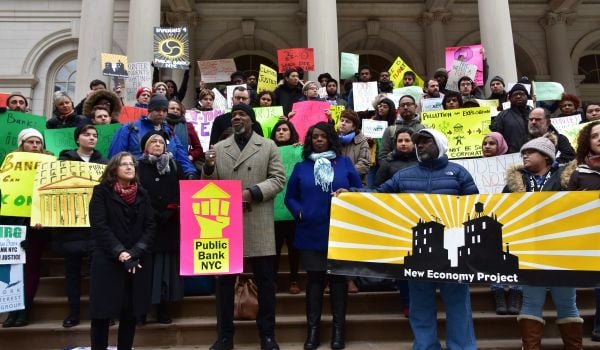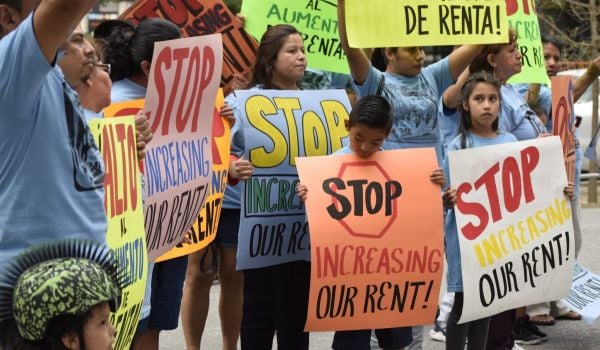At the end of January, the announcement that the Federation Employment & Guidance Service (FEGS) would be closing its doors blindsided many connected to the 80-year-old nonprofit agency. Amid allegations of mismanagement and funneled-away profits, and companies that say FEGS still owes them tens of thousands of dollars, some of New York City’s most vulnerable citizens — or their advocates — were left wondering what would replace the organization’s critical support services.
According to the organization’s still-functioning website, FEGS was founded in 1934 “to help Jewish men and women and others to identify, prepare for, and find jobs and careers; and to fight workplace discrimination for all people.” Eventually the agency expanded its mission to help poor people and those with disabilities in New York City find jobs, adequate housing and proper healthcare. FEGS’ latest numbers showed $202 million in multiple-year contracts with the city and the state.
With 2,000-plus employees, FEGS served over 135,000 people in the New York metropolitan region annually, but last year the organization showed signs of trouble. In the fall, there was an alarming turnover rate in the CEO spot, and in December, the agency announced that it was $19 million in the red. On January 30th, the third CEO in as many months announced FEGS would be shutting down.
Roberta Mueller, co-director of the disability justice program at New York Lawyers for the Public Interest (NYLPI), says that the lack of transparency regarding the FEGS shutdown has been troubling, but she’s also worried about its former clients.
Mueller currently represents a group of developmentally disabled defendants who were subjected to poor conditions, abuse and experimentation at the former Willowbrook State School on Staten Island. Many receive services from FEGS, but she doesn’t know what impact its closure will have on their care.
People receiving full-time, live-in care rely on the consistency of their schedules and their caregivers. While the New York State Office for People With Developmental Disabilities (OPWDD) soon received letters of intent from agencies with fiscal ability to take over FEGS’ support programs, there were still a lot of unanswered questions regarding what the transition would look like.
“I don’t think there were any formal assurances asked for or given by the agencies that they would keep all the same staff in place,” Mueller says. She feared employees would jump ship and leave her clients without support. (Indeed, employees too were left to scramble.)
Tawnie Ferguson, who heads a consumer advisory board that the state authorized to make healthcare decisions for former Willowbrook residents, says that she is familiar with a number of the agencies that will be taking over FEGS contracts. She says the board has had generally good relationships with these organizations in the past and that they should be stepping in at the end of the month.
“There are so many people that are impacted by this, that as this unfolds and other agencies step in, just from the massive number of programs that are impacted, from where I sit, it definitely bears watching,” Ferguson says.
If an organization of this size in America’s largest city can fail without any notice or explanation, what does that say about support service nonprofits in vulnerable communities in cities throughout the country?
“If something this big, that serves so many people, can go bust, it’s really frightening. Especially for the developmentally disabled community,” Mueller says. “If you ever needed to have a safety net, this is the population you need it for.”
FEGS filed for bankruptcy on March 18th, but the investigation into what happened with the nonprofit is ongoing. Speculation has abounded over the fact that the organization had been paying out massive amounts of money to its for-profit subsidiary, AllSector Technology Group. FEGS created the corporation to be a source of revenue for the non-profit, but by 2011, FEGS was paying it money.
In an affidavit for FEGS’ bankruptcy hearing, its current CEO, Kristin Woodlock, pointed to the for-profit ventures as some of the organization’s biggest mistakes.
“An outdated financial management system led to delays and considerable losses in billing and cash collections, causing a further drain on available cash and also compromised management’s ability to make responsive business decisions in a timely manner,” Woodlock wrote in the affidavit.
Doug Sauer, CEO of the New York Council of Nonprofits, says that the introduction of for-profit ventures is a response to larger problem in the nonprofit health and human services world. “Medicaid is cutting back considerably, and they’re trying to push the cost of managed care down to the agencies … . They’re really putting the squeeze on the providers,” Sauer says.
The restructuring of the state’s Medicaid system means that for organizations to continue providing services to the developmentally disabled and mentally ill, they have to increase their scale.
“The push has been merge, consolidate, have a cheaper administrative operation. So what do they do, they go out and try to find other ways to make money, they create these for-profits to try to subsidize what the government’s not paying them to do,” says Sauer, who sees this as bad news for the nonprofit community. “Medicaid is saying, you have to be lean and you can’t afford to have all these smaller nonprofits around. But as we see here, scale doesn’t necessarily do it. FEGS was not too big to fail.”
The Equity Factor is made possible with the support of the Surdna Foundation.
Jenn Stanley is a freelance journalist, essayist and independent producer living in Chicago. She has an M.S. from the Medill School of Journalism at Northwestern University.
Follow Jenn .(JavaScript must be enabled to view this email address)

















